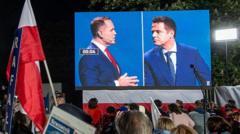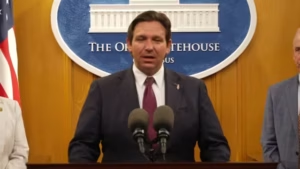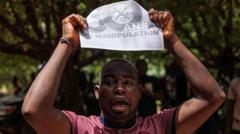As Poland approaches its presidential election, the race appears to be a tight contest between two primary candidates: Rafal Trzaskowski, the liberal mayor of Warsaw, and Karol Nawrocki, the national-conservative historian backed by the Law and Justice party (PiS). Opinion polls indicate the possibility of a run-off on June 1st, suggesting a shift in the political landscape after a decade of rule by outgoing President Andrzej Duda. Voter dissatisfaction with both major parties — Tusk's Civic Platform (PO) and PiS — is prevalent, as critics claim both sides fail to address crucial social issues.
Poland Braces for Closely Contested Presidential Election Amid Political Fatigue

Poland Braces for Closely Contested Presidential Election Amid Political Fatigue
Polish citizens prepare for a presidential election with a potential second round that reflects voter disillusionment with long-standing political parties.
In this election, where the president holds veto power over government legislation, the stakes are high. Observers worldwide noted the significance of the election in restoring democratic values after periods marked by right-wing populism. Yet, ongoing controversies and unfulfilled campaign promises regarding social issues like reproductive rights and media freedom clouds Tusk's governance. Enthusiasm among voters appears muted, reflecting a growing frustration with the political duopoly dominating the Polish landscape who have ruled for two decades.
Trzaskowski currently leads, characterized by his progressive stance on issues including LGBTQ+ rights, while Nawrocki is working to consolidate support from traditionalist voters who prioritize national security and EU relations. As both candidates navigate the complex social and economic landscape — influenced by factors like the war in Ukraine — the election's outcome remains uncertain, with many voters expressing a desire for change in leadership that reflects their priorities and addresses the polarization within Polish society.
While neither candidate is expected to secure an outright victory in the first round, the implications of this election will resonate deeply. For many Poles, the division between the two leading parties may feel less like a choice between ideologically opposed entities and more like a struggle to reclaim agency in a system that often seems stagnant and unresponsive. With the potential for significant shifts in policy, this election represents an opportunity for voters to redefine the political narrative in Poland and shape the future of their democracy.
Trzaskowski currently leads, characterized by his progressive stance on issues including LGBTQ+ rights, while Nawrocki is working to consolidate support from traditionalist voters who prioritize national security and EU relations. As both candidates navigate the complex social and economic landscape — influenced by factors like the war in Ukraine — the election's outcome remains uncertain, with many voters expressing a desire for change in leadership that reflects their priorities and addresses the polarization within Polish society.
While neither candidate is expected to secure an outright victory in the first round, the implications of this election will resonate deeply. For many Poles, the division between the two leading parties may feel less like a choice between ideologically opposed entities and more like a struggle to reclaim agency in a system that often seems stagnant and unresponsive. With the potential for significant shifts in policy, this election represents an opportunity for voters to redefine the political narrative in Poland and shape the future of their democracy.



















